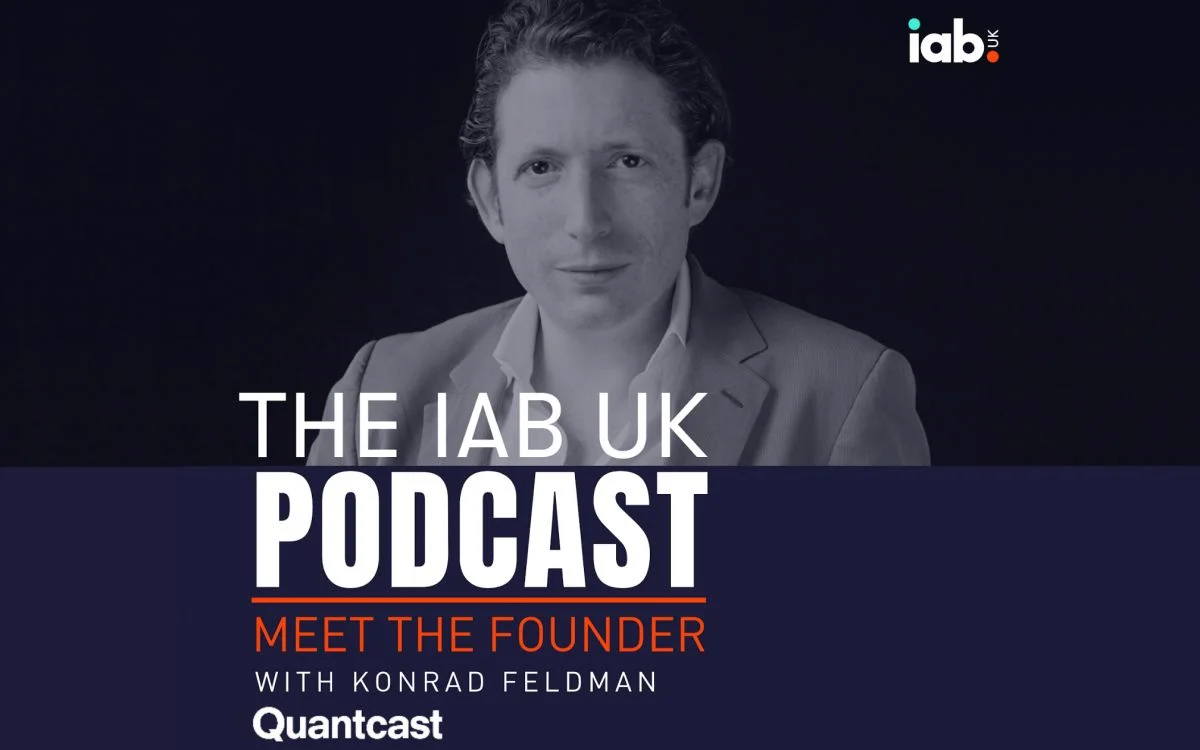Quantcast Founder Konrad Feldman Shares His Stories Within Adtech

Written By
Nisha Ridout

Quantcast Founder and CEO, Konrad Feldman, met with IAB CMO, James Chandler this week to record an episode of the popular ‘Meet The Founder’ podcast series.
Below are a few excerpts from the podcast. It details Konrad’s journey from a career in detecting banking fraud to pioneering ad tech solutions to help publishers to understand their audiences better, all the way up to his present position as founder and CEO of Quantcast, the champion of the free and open internet.
Take us back to where and how it all started. How did you get into the advertising world?
“I studied for my undergraduate degree in computer science at UCL University College London and entered the PhD program there where I got a job as a researcher, with a focus on an area called neural networks.”
“By the mid-90s, I was helping businesses make sense of their increasing amounts of data using artificial intelligence. So along with some colleagues at UCL, I started doing consulting work. That consulting business grew into a software company called Searchspace, which helped banks, financial services, and institutions to understand customer activity. We enabled them to systematically identify problems such as money laundering and the financing of terrorism.”
“Understanding human behavior is much more difficult in an electronic world and much of my career has been focused on how we can use machines to help with that, and be able to respond with some of the flexibility, and perhaps with some of the ingenuity of human decision-makers.”
“Fast forward to 1999, I moved to the U.S. with Searchspace, while similar challenges of understanding data in e-commerce continued to arise. I was spending much of my time in Silicon Valley with big companies and some of the early search engines on the internet such as AltaVista.”
“By 2006, I had moved to San Francisco from New York and I was thinking about ways in which I could apply my experience in artificial intelligence and machine learning. The idea we had was to do something around internet data and advertising, but what? Search advertising seemed to be working so efficiently, but most other advertising on websites seemed irrelevant to the consumer viewing it. I was working with a small team, essentially an incubator, where we were testing out different ideas in a number of areas. I didn't know very much about advertising at all, so we actually put a Help Wanted ad on Craigslist. Fortunately, we got lots of responses and bought a lot of beer to celebrate.”
“From these meetings, we wondered if it was possible to directly observe media consumption and then use machine learning techniques to understand audiences. After testing this, we found that if you could have a mechanism through which you gain enough visibility, you could understand more about audiences, and then organize that information in a way that is accessible to advertisers. That’s what became Quantcast.”
Tell us more about your stance towards a free and open internet.
“Today, I am a big believer in championing the free and open internet. With an internet connection and access to a computer, anyone can share content, their creativity, their point of view, and their observations with the world, which has democratized content distribution and information. And that's a phenomenal asset for the world.”
“Today, 5 billion people around the world rely on the open internet for all of those things. I think one of the things that perhaps isn't fairly appreciated or understood is that advertising funds the free and open internet. The original sin was leading people to believe that the internet was free. Whilst it's free to access, it's not free to create content, and valuable content is a labor of love. People put a lot of effort into it, and need to be remunerated for doing so. It is advertising that's funded that and it's actually advertising technology that underpins making ad budgets accessible for any publisher. But even with that, we've seen this gradual concentration of spend into the walled gardens. We see moves afoot to encourage even more spend to go into them. That won’t end well for the open internet.”
“I think it's really important that although the internet democratized content distribution, we've got to democratize ad funding, so that more of it will go to the publishers, the content producers. Ad spend shouldn't just be accessible to the technology giants. At Quantcast, we're focused on bringing the same benefits of internet-scale data, machine learning, and ease of use to advertisers on the open internet, while striving to deliver the same level of performance as the walled gardens. We are essentially making the open internet as accessible as possible.”
To listen to the full interview, click here.
Share article
Want to advertise on the open internet?

